Related Research Articles
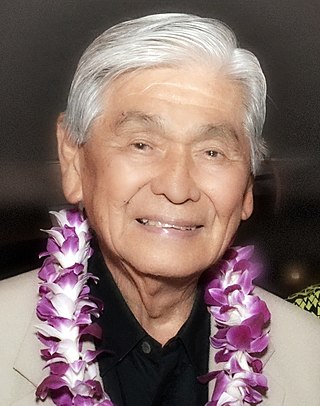
George Ryoichi Ariyoshi is an American lawyer and politician who served as the third governor of Hawaii from 1974 to 1986. A Democrat, he is Hawaii's longest-serving governor and the first American of Asian descent to serve as governor of a U.S. state. He assumed gubernatorial powers and duties when Governor John A. Burns was declared incapacitated in October 1973 and was elected in 1974, becoming the first Asian-American to be elected governor of a U.S. state or territory. His lengthy tenure is a record likely to remain unbroken due to term limits enacted after he left office. Ariyoshi is now considered an elder statesman of the Democratic Party of Hawaiʻi.
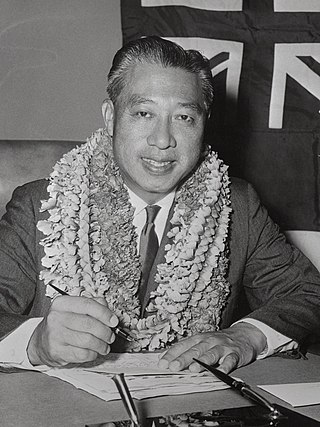
Hiram Leong Fong was an American businessman, lawyer, and politician from Hawaii. Born to a Cantonese immigrant sugar plantation worker, Fong became the first Chinese-American and first Asian-American United States Senator, serving from 1959 to 1977.

John Anthony Burns was an American politician. Burns was born in Montana and became a resident of Hawaii in 1913. He served as the second governor of Hawaii from 1962 to 1974.

The Territory of Hawaii or Hawaii Territory was an organized incorporated territory of the United States that existed from April 30, 1900, until August 21, 1959, when most of its territory, excluding Palmyra Island, was admitted to the United States as the 50th U.S. state, the State of Hawaii. The Hawaii Admission Act specified that the State of Hawaii would not include Palmyra Island, the Midway Islands, Kingman Reef, and Johnston Atoll, which includes Johnston Island and Sand Island.
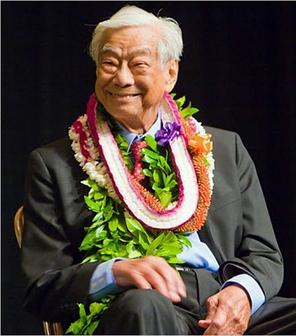
William Shaw Richardson was an American attorney, political figure, and chief justice of the Hawaii State Supreme Court from 1966 to 1982. Prior to his service as the top jurist in Hawaii, Richardson was lieutenant governor under John A. Burns. Previous to that tenure from 1956 to 1962 he was chairman of the Democratic Party of Hawaii.

Joseph Boyd Poindexter was the eighth Territorial Governor of Hawaii and served from 1934 to 1942.

Ingram Macklin Stainback was an American politician. He served as the ninth Territorial Governor of Hawaii from 1942 to 1951.

Samuel Wilder King was the eleventh Territorial Governor of Hawaii and served from 1953 to 1957. He was appointed to the office after the term of Oren E. Long. Previously, King served in the United States House of Representatives as a delegate from the Territory of Hawaii. He was a member of the Republican Party of Hawaii and was the first of native Hawaiian descent to rise to the highest office in the territory.

Thomas Ponce Gill was a Hawaii politician. A member of the Democratic party, he served in the United States Congress from 1963 to 1965 and was the fourth lieutenant governor of Hawaii from 1966 to 1970. He unsuccessfully ran for governor twice, in 1970 and 1974.

Nelson Kiyoshi Doi, was the sixth lieutenant governor of Hawaii from 1974 to 1978 in the first elected administration of Governor George Ariyoshi. Doi was a member of the Hawaii Democratic Party.

James Kimo Kealoha was an American politician who served as the first lieutenant governor of Hawaii in the administration of Governor of Hawaiʻi William F. Quinn. Prior to his election as Lieutenant Governor, Kealoha served a number of years as a legislator on Hawaii island, distinguishing himself as a respected leader.

The Admission Act, formally An Act to Provide for the Admission of the State of Hawaii into the Union is a statute enacted by the United States Congress and signed into law by President Dwight D. Eisenhower which dissolved the Territory of Hawaii and established the State of Hawaii as the 50th state to be admitted into the Union. Statehood became effective on August 21, 1959. Hawaii remains the most recent state to join the United States.
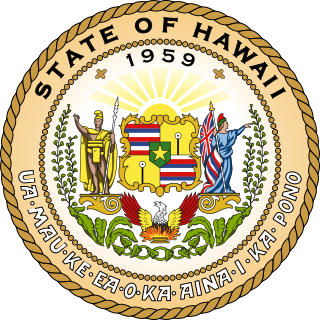
The Attorney General of Hawaii is the chief legal officer and chief law enforcement officer of Hawaii. In present-day statehood within the United States, the Attorney General is appointed by the elected governor with the approval of the state senate and is responsible for a state department charged with advising the various other departments and agencies of state government. The Attorney General is responsible for the prosecution of offenses under state law. The Attorney General can only be removed by an act of the state senate. In rare occasions, the Attorney General serves as acting governor in the absence of both the governor and lieutenant governor from the state for an extended period of time.

The Hawaii Republican Party is the affiliate of the Republican Party (GOP) in Hawaii, headquartered in Honolulu. The party was initially strong during Hawaii's territorial days, but following statehood the Democratic Party has become the dominant party in Hawaii. The party currently has very weak electoral power in the state and is one of the weakest affiliates of the national Republican Party; it currently controls none of Hawaii's statewide or federal elected offices.

The Democratic Party of Hawaiʻi is the affiliate of the Democratic Party in the state of Hawaii.

The politics of the U.S. state of Hawaii typically take place within the framework of a Democrat-dominated government. The Democratic Party in Hawaii was formed in 1900, by supporters of Queen Liliʻuokalani. For the first half of the twentieth century, the Republican Party ruled comfortably, dominating local politics until the end of World War II. After the war, Honolulu police officer John A. Burns began organizing plantation laborers, including many Japanese Americans and Filipino Americans and built a coalition that gradually strengthened the Democratic Party in Hawaii. This culminated in the Hawaii Democratic Revolution of 1954, after which Republican political influence in the islands was greatly diminished.

The Hawaii Democratic Revolution of 1954 is a popular term for the territorial elections of 1954 in which the long dominance of the Hawaii Republican Party in the legislature came to an abrupt end, replaced by the Democratic Party of Hawaii which has remained dominant since. The shift was preceded by general strikes, protests, and other acts of civil disobedience that took place in the Hawaiian Archipelago. The strikes by the Isles' labor workers demanded similar pay and benefits to their Mainland counterparts. The strikes also crippled the power of the sugarcane plantations and the Big Five Oligopoly over their workers.
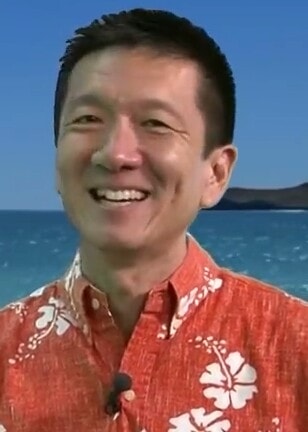
Douglas S. Chin is an American attorney and politician who served as the 14th Lieutenant Governor of Hawaii from February to December 2018. A member of the Democratic Party, Chin previously was the 14th Attorney General of Hawaii. On December 18, 2017, Chin announced his intent to run for the U.S. House of Representatives. In February 2018, Chin became Lieutenant Governor of Hawaii after the resignation of Shan Tsutsui and after two others in the line of succession declined the office. In August 2018, he lost the Congressional seat's Democratic nomination to Ed Case.
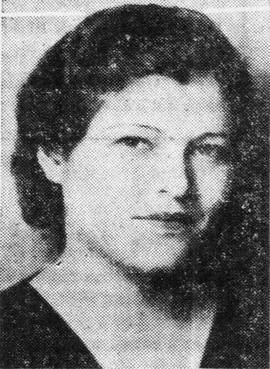
Thelma Alice Kalaokona Moore Akana Harrison was an American public health nurse and politician who served as a Republican Senator for Oahu in the Hawaii Territorial Legislature. She was the first woman to be reelected to the Territorial Senate.
References
- ↑ ; URL accessed Dec, 2013.
- ↑ "Chuck Mau in Social Security Death Index". Fold3. Retrieved 2022-03-07.
- 1 2 Coffman, Tom (2003-02-28). The Island Edge of America: A Political History of Hawaii. University of Hawaii Press. ISBN 978-0-8248-2662-8.
- ↑ Burns, Brendan (2014). An Aura of Greatness: A Reflection of Governor John A. Burns. Aignos. pp. Kindle 46%, page 969. ISBN 978-0-9904322-2-7.
- ↑ http://scholarspace.manoa.hawaii.edu/handle/10125/29922.. Retrieved Dec 2013.
- ↑ Congress, United States (1950). Congressional Record: Proceedings and Debates of the ... Congress. U.S. Government Printing Office.